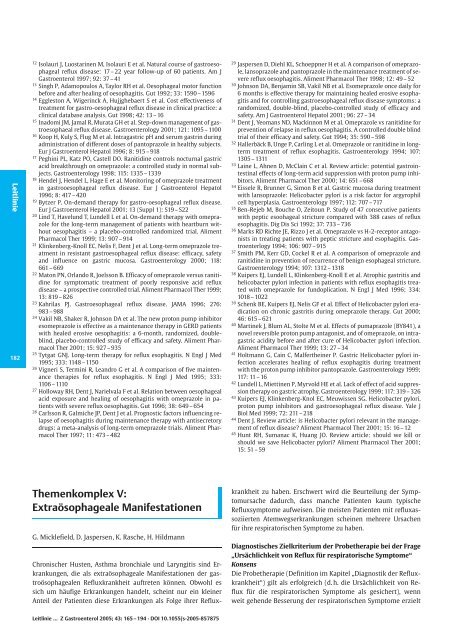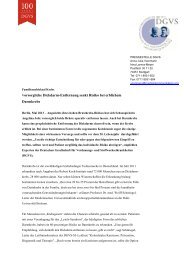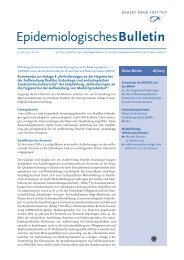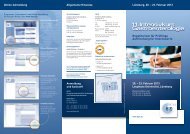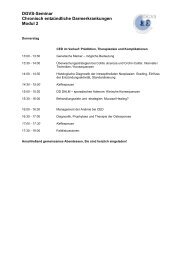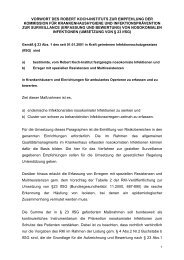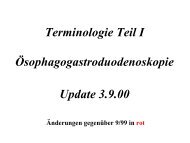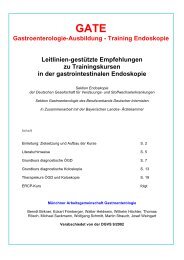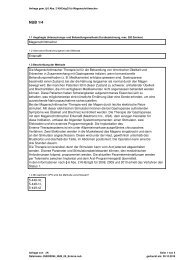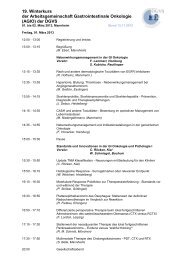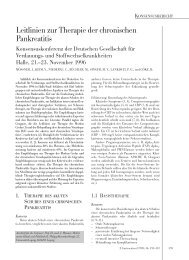Gastroösophageale Refluxkrankheit – Ergebnisse einer - DGVS
Gastroösophageale Refluxkrankheit – Ergebnisse einer - DGVS
Gastroösophageale Refluxkrankheit – Ergebnisse einer - DGVS
Sie wollen auch ein ePaper? Erhöhen Sie die Reichweite Ihrer Titel.
YUMPU macht aus Druck-PDFs automatisch weboptimierte ePaper, die Google liebt.
Leitlinie 182<br />
12 Isolauri J, Luostarinen M, Isolauri E et al. Natural course of gastroesophageal<br />
reflux disease: 17<strong>–</strong>22 year follow-up of 60 patients. Am J<br />
Gastroenterol 1997; 92: 37<strong>–</strong>41<br />
13 Singh P, Adamopoulos A, Taylor RH et al. Oesophageal motor function<br />
before and after healing of oesophagitis. Gut 1992; 33: 1590 <strong>–</strong> 1596<br />
14 Eggleston A, Wigerinck A, Hujjghebaert S et al. Cost effectiveness of<br />
treatment for gastro-oesophageal reflux disease in clinical practice: a<br />
clinical database analysis. Gut 1998; 42: 13 <strong>–</strong> 16<br />
15 Inadomi JM, Jamal R, Murata GH et al. Step-down management of gastroesophaeal<br />
reflux disease. Gastroenterology 2001; 121: 1095 <strong>–</strong> 1100<br />
16 Koop H, Kuly S, Flug M et al. Intragastric pH and serum gastrin during<br />
administration of different doses of pantoprazole in healthy subjects.<br />
Eur J Gastroenterol Hepatol 1996; 8: 915<strong>–</strong>918<br />
17 Peghini PL, Katz PO, Castell DO. Ranitidine controls nocturnal gastric<br />
acid breakthrough on omeprazole: a controlled study in normal subjects.<br />
Gastroenterology 1998; 115: 1335 <strong>–</strong> 1339<br />
18 Hendel J, Hendel L, Hage E et al. Monitoring of omeprazole treatment<br />
in gastrooesophageal reflux disease. Eur J Gastroenterol Hepatol<br />
1996; 8: 417 <strong>–</strong>420<br />
19 Bytzer P. On-demand therapy for gastro-oesophageal reflux disease.<br />
Eur J Gastroenterol Hepatol 2001; 13 (Suppl 1): S19<strong>–</strong>S22<br />
20 Lind T, Havelund T, Lundell L et al. On-demand therapy with omeprazole<br />
for the long-term management of patients with heartburn without<br />
oesophagitis <strong>–</strong> a placebo-controlled randomized trial. Aliment<br />
Pharmacol Ther 1999; 13: 907<strong>–</strong>914<br />
21 Klinkenberg-Knoll EC, Nelis F, Dent J et al. Long-term omeprazole treatment<br />
in resistant gastroesophageal reflux disease: efficacy, safety<br />
and influence on gastric mucosa. Gastroenterology 2000; 118:<br />
661<strong>–</strong>669<br />
22 Maton PN, Orlando R, Joelsson B. Efficacy of omeprazole versus ranitidine<br />
for symptomatic treatment of poorly responsive acid reflux<br />
disease <strong>–</strong> a prospective controlled trial. Aliment Pharmacol Ther 1999;<br />
13: 819 <strong>–</strong>826<br />
23 Kahrilas PJ. Gastroesophageal reflux disease. JAMA 1996; 276:<br />
983<strong>–</strong> 988<br />
24 Vakil NB, Shaker R, Johnson DA et al. The new proton pump inhibitor<br />
esomeprazole is effective as a maintenance therapy in GERD patients<br />
with healed erosive oesophagitis: a 6-month, randomized, doubleblind,<br />
placebo-controlled study of efficacy and safety. Aliment Pharmacol<br />
Ther 2001; 15: 927<strong>–</strong> 935<br />
25 Tytgat GNJ. Long-term therapy for reflux esophagitis. N Engl J Med<br />
1995; 333: 1148 <strong>–</strong>1150<br />
26 Vigneri S, Termini R, Leandro G et al. A comparison of five maintenance<br />
therapies for reflux esophagitis. N Engl J Med 1995; 333:<br />
1106 <strong>–</strong> 1110<br />
27 Holloway RH, Dent J, Narielvala F et al. Relation between oesophageal<br />
acid exposure and healing of oesophagitis with omeprazole in patients<br />
with severe reflux oesophagitis. Gut 1996; 38: 649 <strong>–</strong> 654<br />
28 Carlsson R, Galmiche JP, Dent J et al. Prognostic factors influencing relapse<br />
of oesophagitis during maintenance therapy with antisecretory<br />
drugs: a meta-analysis of long-term omeprazole trials. Aliment Pharmacol<br />
Ther 1997; 11: 473 <strong>–</strong> 482<br />
Themenkomplex V:<br />
Extraösophageale Manifestationen<br />
G. Micklefield, D. Jaspersen, K. Rasche, H. Hildmann<br />
Chronischer Husten, Asthma bronchiale und Laryngitis sind Erkrankungen,<br />
die als extraösophageale Manifestationen der gastroösophagealen<br />
<strong>Refluxkrankheit</strong> auftreten können. Obwohl es<br />
sich um häufige Erkrankungen handelt, scheint nur ein kl<strong>einer</strong><br />
Anteil der Patienten diese Erkrankungen als Folge ihrer Reflux-<br />
Leitlinie … Z Gastroenterol 2005; 43: 165 <strong>–</strong> 194 · DOI 10.1055/s-2005-857875<br />
29 Jaspersen D, Diehl KL, Schoeppner H et al. A comparison of omeprazole,<br />
lansoprazole and pantoprazole in the maintenance treatment of severe<br />
reflux oesophagitis. Aliment Pharmacol Ther 1998; 12: 49 <strong>–</strong>52<br />
30 Johnson DA, Benjamin SB, Vakil NB et al. Esomeprazole once daily for<br />
6 months is effective therapy for maintaining healed erosive esophagitis<br />
and for controlling gastroesophageal reflux disease symptoms: a<br />
randomized, double-blind, placebo-controlled study of efficacy and<br />
safety. Am J Gastroenterol Hepatol 2001; 96: 27<strong>–</strong>34<br />
31 Dent J, Yeomans ND, Mackinnon M et al. Omeprazole vs ranitidine for<br />
prevention of relapse in reflux oesophagitis. A controlled double blind<br />
trial of their efficacy and safety. Gut 1994; 35: 590 <strong>–</strong> 598<br />
32 Hallerbäck B, Unge P, Carling L et al. Omeprazole or ranitidine in longterm<br />
treatment of reflux esophagitis. Gastroenterology 1994; 107:<br />
1305 <strong>–</strong> 1311<br />
33 Laine L, Ahnen D, McClain C et al. Review article: potential gastrointestinal<br />
effects of long-term acid suppression with proton pump inhibitors.<br />
Aliment Pharmacol Ther 2000; 14: 651 <strong>–</strong> 668<br />
34 Eissele R, Brunner G, Simon B et al. Gastric mucosa during treatment<br />
with lansoprazole: Helicobacter pylori is a risk factor for argyrophil<br />
cell hyperplasia. Gastroenterology 1997; 112: 707 <strong>–</strong> 717<br />
35 Ben-Rejeb M, Bouche O, Zeitoun P. Study of 47 consecutive patients<br />
with peptic esoohageal stricture compared with 388 cases of reflux<br />
esophagitis. Dig Dis Sci 1992; 37: 733<strong>–</strong> 736<br />
36 Marks RD Richte JE, Rizzo J et al. Omeprazole vs H-2-receptor antagonists<br />
in treating patients with peptic stricture and esophagitis. Gastroenterlogy<br />
1994; 106: 907<strong>–</strong>915<br />
37 Smith PM, Kerr GD, Cockel R et al. A comparison of omeprazole and<br />
ranitidine in prevention of recurrence of benign esophageal stricture.<br />
Gastroenterology 1994; 107: 1312 <strong>–</strong> 1318<br />
38 Kuipers EJ, Lundell L, Klinkenberg-Knoll E et al. Atrophic gastritis and<br />
helicobacter pylori infection in patients with reflux esophagitis treated<br />
with omeprazole for fundoplication. N Engl J Med 1996; 334:<br />
1018<strong>–</strong>1022<br />
39 Schenk BE, Kuipers EJ, Nelis GF et al. Effect of Helicobacter pylori eradication<br />
on chronic gastritis during omeprazole therapy. Gut 2000;<br />
46: 615<strong>–</strong>621<br />
40 Martinek J, Blum AL, Stolte M et al. Effects of pumaprazole (BY841), a<br />
novel reversible proton pump antagonist, and of omeprazole, on intragastric<br />
acidity before and after cure of Helicobacter pylori infection.<br />
Aliment Pharmacol Ther 1999; 13: 27 <strong>–</strong>34<br />
41 Holtmann G, Cain C, Malferth<strong>einer</strong> P. Gastric Helicobacter pylori infection<br />
accelerates healing of reflux esophagitis during treatment<br />
with the proton pump inhibitor pantoprazole. Gastroenterology 1999;<br />
117: 11 <strong>–</strong> 16<br />
42 Lundell L, Miettinen P, Myrvold HE et al. Lack of effect of acid suppression<br />
therapy on gastric atrophy. Gastroenterology 1999; 117: 319 <strong>–</strong> 326<br />
43 Kuipers EJ, Klinkenberg-Knol EC, Meuwissen SG. Helicobacter pylori,<br />
proton pump inhibitors and gastroesophageal reflux disease. Yale J<br />
Biol Med 1999; 72: 211 <strong>–</strong> 218<br />
44 Dent J. Review article: is Helicobacter pylori relevant in the management<br />
of reflux disease? Aliment Pharmacol Ther 2001; 15: 16 <strong>–</strong>12<br />
45 Hunt RH, Sumanac K, Huang JO. Review article: should we kill or<br />
should we save Helicobacter pylori? Aliment Pharmacol Ther 2001;<br />
15: 51<strong>–</strong>59<br />
krankheit zu haben. Erschwert wird die Beurteilung der Symptomursache<br />
dadurch, dass manche Patienten kaum typische<br />
Refluxsymptome aufweisen. Die meisten Patienten mit refluxassoziierten<br />
Atemwegserkrankungen scheinen mehrere Ursachen<br />
für ihre respiratorischen Symptome zu haben.<br />
Diagnostisches Zielkriterium der Probetherapie bei der Frage<br />
„Ursächlichkeit von Reflux für respiratorische Symptome“<br />
Konsens<br />
Die Probetherapie (Definition im Kapitel „Diagnostik der <strong>Refluxkrankheit</strong>“)<br />
gilt als erfolgreich (d. h. die Ursächlichkeit von Reflux<br />
für die respiratorischen Symptome als gesichert), wenn<br />
weit gehende Besserung der respiratorischen Symptome erzielt


